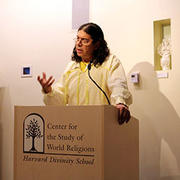
The Center for the Study of World Religions is privileged each year to host the Dana McLean Greeley Lecture for Peace and Social Justice. This lecture highlights issues of peace, social justice and inter-religious dialogue, such as reach a broad audience in the Harvard community and beyond. The original gift was made in honor of the Reverend Dana McLean Greeley (BS '31, bachelor's in sacred theology in 1933); he believed that people of all backgrounds and faiths are deeply connected to one another and should work together for positive social change. Previous lecturers include: Thomas Halik (theologian and public intellectual, Czech Republic); Kiran Martin (founder of Asha, which offers educational and health services in the poorest sections of New Delhi); Marshall Ganz (Harvard's Kennedy School of Government); Eboo Patel (founder and director of the Interfaith Youth Core); Shanta Premwardhana (Director, Interreligious Dialogue and Cooperation at World Council of Churches; Atalia Omer (Kroc Institute for International Peace Studies, Notre Dame).
This year's Greeley Lecturer was Dr. Richard Grounds, Executive Director of the Yuchi Language Project. (Read our interview with Dr. Grounds here.) He spoke at the Center on October 19, on the bracing theme, "Reparations for Native American Languages? Churches, Governments, and Cultural Genocide." While most of those in the crowded room knew the tragic story in general of the plunder of the Native Americans' lands and human rights, Grounds focused intensely on a most intimate and devastating aspect of this violence, the alienation of the Native Americans from their own languages. Government policy led to the establishment of English-medium boarding schools, to which children were brought often reluctantly, and sometimes forcibly. Churches were sometimes complicit in the creation of compulsory all-English education, the effect of which was in many cases the loss of fluency in the native tongue and, given the compulsion, the reluctance of parents to pass along the Native languages to their children. The result of this sad history is linguistic–and cultural and religious–amnesia, with all the cascading ill effects on cultural and religious identities as well. Grounds offered impassioned and eloquent insights into these painful issues, while yet evoking the beauty of his Yuchi language, often interspersing his remarks with sentences in Yuchi, giving us living words that brought the issues eloquently and painfully to life. He also introduced us to some of the many ways he and his colleagues are seeking to teach Yuchi to today's children.
Grounds also drew an analogy between the destruction of living languages with environmental destruction and the loss of entire species: without a language, a community—particularly a small and endangered one—becomes all the more vulnerable and at risk in the face of larger economic and political, cultural and religious pressures. Some of the damage can be remedied; much seems to be irreversible. Ought not there be reparations to Native peoples for the onslaught against their languages? The video of the lecture can be found here.
In the discussion that followed the lecture, we explored the history and politics of these sad events, the mechanics of alienation in so many boarding school contexts, and the complicated interaction of governmental and religiously-inspired interventions and interferences in Native American lives. Unsurprisingly in the context of the Center for the Study of World Religions, we moved also more directly into issues of religious import, the centrality of language to the religious identity and practice of any community, and the concomitant devastating effects of the loss of language, for identity and continuity of tradition, community and worship. One cannot study religions without appreciating the centrality of sacred and living languages.
We were left with the question of what comes next. We are used to welcoming lecturers, hearing them speak (and if we are able, inviting them to class, as Professor Ann Braude invited Dr. Grounds to her class the next day), and adding their names to list of successful Center lecturers. But when faced with such a clear testimony to linguistic and cultural suffering, so forcefully put before us, we were also left in the situation of asking what we can do, at least to keep these issues before our community. The "study of world religions" has a venerable history, but Dr. Grounds reminded us of an urgent, inner edge of that study: "Let those who have ears, hear."
Note: The Greeley Fund also supports the annual International Internship Grants, available to MTS and MDiv students planning interfaith work abroad in the summer.
—by Francis X. Clooney, S.J., director of the Center for the Study of World Religions, Parkman Professor of Divinity, Professor of Comparative Theology
